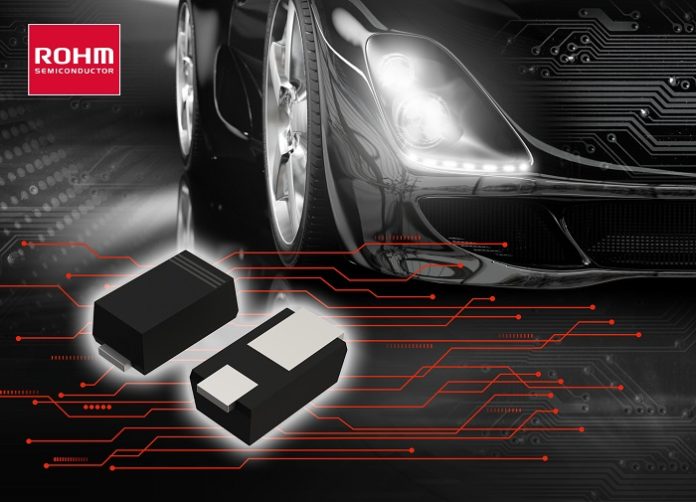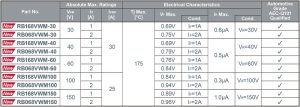ROHM added 14 new models to its PMDE package (2.5mm × 1.3mm) lineup – meeting the requirements for smaller protection and switching circuits. (RBxx8 Series, RFN Series, VS Series) 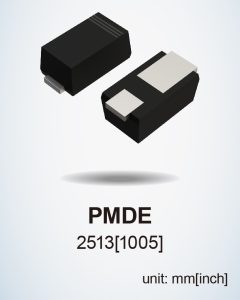
Diodes are used for rectification, protection and switching circuit in a wide range of applications such as automotive, industrial, and consumer fields. Additionally, there is an increasing need to reduce package size to minimize mounting area. At the same time, higher performance is required to reduce power consumption.
However, when decreasing package size the surface area of the backside electrode and mold also becomes smaller, resulting in lower heat dissipation. To solve this disadvantage, ROHM’s PMDE package improves heat dissipation performance by expanding the backside electrode and optimizing the heat dissipation path.
This achieves the same electrical characteristics as those of conventional packages in smaller package sizes.
ROHM’s proprietary compact PMDE package features a land pattern equivalent to that of the conventional SOD-323 type. Reviewing the backside electrode and heat dissipation path allowed ROHM to achieve the same electrical characteristics (i.e. current, withstand voltage) as the standard SOD-123FL package (3.5mm × 1.6mm) in a smaller package size, contributing to board miniaturization by reducing mounting area by approximately 42%. Furthermore, mechanical strength is around 1.4 times higher than that of the SOD-123FL, reducing the risk of solder cracking when stress is applied to the board, ensuring greater mounting reliability.
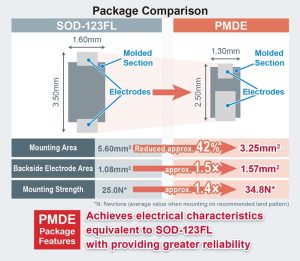 The PMDE package lineup consists of 8 models in the RBxx8 series of Schottky barrier diodes (SBDs), 2 models in the RFN series of fast recovery diodes (FRDs), and 2 models in the VS series of transient voltage suppressors (TVSs). A variety of circuit applications can be achieved with compact diodes.
The PMDE package lineup consists of 8 models in the RBxx8 series of Schottky barrier diodes (SBDs), 2 models in the RFN series of fast recovery diodes (FRDs), and 2 models in the VS series of transient voltage suppressors (TVSs). A variety of circuit applications can be achieved with compact diodes.
Going forward, ROHM will strive to further improve quality of its semiconductor devices, from low to high voltages while strengthening its distinctive lineup to further reduce power consumption and achieve greater package miniaturization.
Key Features of the PMDE Package
- Significantly improved heat dissipation achieves 42% smaller mounting area.
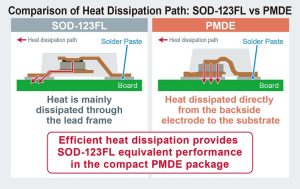 Generally, semiconductor components dissipate heat generated into the air or through the substrate. However, when decreasing package size the surface area of the back of the electrode and mold also becomes smaller, resulting in lower heat dissipation.
Generally, semiconductor components dissipate heat generated into the air or through the substrate. However, when decreasing package size the surface area of the back of the electrode and mold also becomes smaller, resulting in lower heat dissipation.
The PMDE package, to solve this problem, increases the back electrode area to facilitate the heat dissipation path from the lead frame to the substrate. The result is significantly improved heat dissipation performance, achieving the same electrical characteristics as the standard SOD-123FL package (3.5mm × 1.6mm) with in a smaller 2.5mm × 1.3mm size. This translates to a 42% smaller mounting area, making it ideal for automotive applications where higher component density is needed
- Ensures higher reliability compared to conventional packages
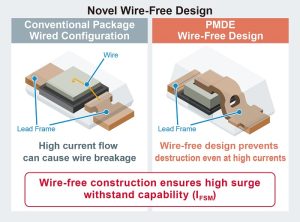 The PMDE package achieves a mounting strength of 34.8N, approximately 1.4 times higher than that of the SOD-123FL package, by increasing the area of the metal portion that ensures a larger backside electrode area. This reduces the risk of solder cracking when stress is applied to the board, contributing to greater reliability. High surge current withstand capability (IFSM) is also achieved by adopting a wire-free structure whereby the chip is directly sandwiched between frames. The resulting high surge current withstand capability (IFSM) provides superior resistance to destruction caused by high instantaneous currents, such as during vehicle start or abnormal device operation.
The PMDE package achieves a mounting strength of 34.8N, approximately 1.4 times higher than that of the SOD-123FL package, by increasing the area of the metal portion that ensures a larger backside electrode area. This reduces the risk of solder cracking when stress is applied to the board, contributing to greater reliability. High surge current withstand capability (IFSM) is also achieved by adopting a wire-free structure whereby the chip is directly sandwiched between frames. The resulting high surge current withstand capability (IFSM) provides superior resistance to destruction caused by high instantaneous currents, such as during vehicle start or abnormal device operation.
PMDE Package Products
The PMDE package offers the same electrical characteristics as the conventional SOD-123FL package in a smaller package size with ensuring better heat dissipation performance and mounting reliability. In addition, all automotive-compatible part numbers are qualified under the AEC-Q101 standard for automotive reliability. Our new lineups of PMDE package products are listed below. (SBDs: RBR series only, in mass production from June 2021)
- SBDs: RBxx8 Series Features (New Products)
These SBDs deliver low VF together with high efficiency. 10 models in the PMDE package with breakdown voltages from 30V to 150V have been added to the RBxx8 series that provide ultra-low IR (reverse current) and can operate stably even in high temperature environments.
- RBxx8 Series Lineup Table
- SBDs: RBR Series Features (Announced in August 2021)
The RBR series balances the trade-off relationship between low VF which is key to improving efficiency and low IR (mass produced since June 2020), 6 models in the series are available in the PMDE package.
- RBR Series (PMDE Package) Lineup Table
- FRDs: RFN Series Features (New Products)
FRDs provide high withstand voltage (up to 800V) equivalent to rectifier diodes along with excellent trr (reverse recovery time), which is important for high-frequency operation. The RFN series offers the same electrical characteristics as conventional products in a compact PMDE package.
- RFN Series (PMDE Package) Lineup Table
- TVS: VS Series Features (New Products)
TVS is a type of diode that absorbs the sudden voltage (surge voltage) that flows during engine startup or breakdown, then steps down to a constant voltage. The VS series supports a wide range of standoff voltages (VRWM) from 5V to 130V.
(32 ranks of standoff voltages are offered between 5V and 130V)
- VS Series (PMDE Package) Lineup Table
Pricing: $0.2/units (samples, excluding tax)
Availability: In mass production, through online distributors Digi-key, Mouser, and Farnell
Application Examples
Terminology
AEC-Q101 Automotive Reliability Standard
AEC stands for Automotive Electronics Council, an organization (comprised of major automotive manufacturers and component makers) responsible for establishing reliability standards for automotive electronics. The Q101 standard is specifically applies to discrete semiconductor components (i.e. transistors and diodes).
Forward Voltage VF
A voltage drop occurs when electricity flows in the forward direction from + to -. The lower this value, the higher the efficiency.
Reverse Current IR
Reverse current generated when reverse voltage is applied. The lower this value is, the smaller the power consumption (reverse power loss).
Reverse Recovery Time trr
The time it takes for the diode to switch from the ON state to completely OFF. The lower this value is, the smaller the loss during switching.
Surge
A large voltage or current suddenly occurs. Surge events such as static electricity, lightning, and cranking when starting the engine can be generated in a variety of cases depending on the application, so when designing circuits it is essential to include protection circuits that will not fail in the event of these abnormalities.
for more information, visit: http://www.rohm.com/



